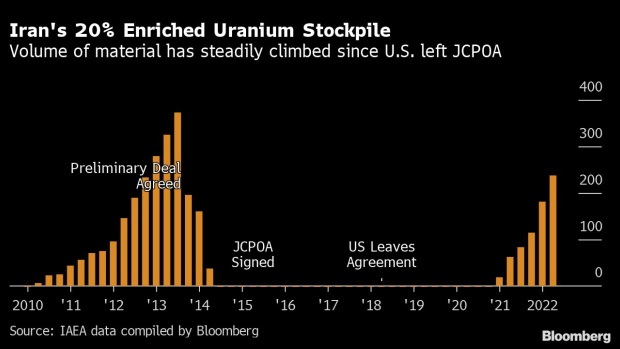Aug 26, 2022
US and Iran Close to Nuclear Deal But Final Push May Take Weeks
, Bloomberg News

(Bloomberg) -- The US and Iran remain at loggerheads over key details of an emerging deal to revive a landmark nuclear agreement and may need several weeks to resolve their differences, according to officials familiar with the talks.
Expectations of an imminent breakthrough grew as Washington and Tehran responded to a “final” European Union proposal that would ease sanctions on Iran’s economy, including oil exports, in return for scaling back its advancing atomic program. One senior European official said the sides have never been closer to rebooting their 2015 accord, echoing comments by a top Biden administration adviser.
Yet two other officials with knowledge of the negotiations said clashes continue over international monitors’ investigation into the Islamic Republic’s past nuclear work, and economic indemnities demanded by Tehran if a future US government exits the agreement, as then-President Donald Trump did four years ago.
All the officials asked not to be identified in exchange for discussing sensitive information.
The talks are being closely watched by oil and gas traders -- and politicians facing a public backlash as high energy prices send inflation spiraling around the world. A deal could release millions of barrels of oil and refined products that Iran has stored since the Trump administration re-imposed US sanctions in 2018.
While parties to the talks haven’t publicly commented on the details of recent developments, there’s a sense that Tehran faces pressure to concede more ground. This month, it dropped a demand that the US remove elite Iranian forces from a list of foreign terrorist organizations.
“The ball is in Iran’s court,” French President Emmanuel Macron said on Friday during a visit to Algeria.
A White House National Security Council spokesperson acknowledged that gaps remain in the talks and said the US is continuing to negotiate. The spokesperson, who declined to comment further, said that Iranian centrifuges would be removed and that even if Iran abandoned the deal, it would need six months to pursue a nuclear weapon.
Iran said Wednesday it was reviewing the US response to the EU plan and would comment once the assessment is complete. It gave no further details except to signal that the back-and-forth was likely to continue.
The International Atomic Energy Agency, whose inspectors have been probing uranium traces detected at several undeclared sites for more than three years, holds two key meetings in September that will be attended by senior officials from all the parties to the original 2015 agreement: China, France, Germany, Iran, Russia, the UK and US.
The NSC spokesperson said Iran needs to answer the IAEA’s questions and the US is unbending in its support of the agency’s independence.
The IAEA investigation has emerged as a major point of contention and obstacle to progress in recent weeks. But the agency’s director general, Rafael Mariano Grossi, suggested this week during an interview on PBS that a resolution to the investigation is possible.
“We are going to get there,” said the Argentine diplomat, adding that reviving the nuclear accord will allow IAEA monitors to resume expansive surveillance and snap inspections.
Iran wants to see how the agency’s board of governors treats the probe at a week-long meeting convening Sept. 12 in Vienna. Officials said that while it’s unlikely the IAEA will completely drop it, investigators may be able to conclude their work within the framework of the nuclear deal.
Iran responded to Trump’s exit by massively expanding its uranium enrichment, producing material just below the purity levels required for nuclear warheads. Tehran denies its atomic program is intended to produce weapons, but its advances alarmed regional rivals including Israel, which opposes resurrecting a deal it says will eventually strengthen Tehran militarily.
The US this week carried out airstrikes in eastern Syria against groups tied to Iran’s Islamic Revolutionary Guard Corps after rockets were fired at two bases where Americans are stationed. Iran is a key ally of Syrian President Bashar al-Assad.
The Biden adminsitration denied that its strikes are linked to the talks. Regional attacks by Iran and its proxies have in the past escalated during periods of raised tensions over nuclear negotiations, though recent weeks have been relatively quiet.
Even if Washington and Tehran agree to revive the accord, implementing it will be a challenge, according to the European official, implying that a full Iranian return to oil markets would take months.
That’s a problem for US officials walking a negotiating tightrope. Any additional concessions made to Iran raise the prospect of triggering a new review among skeptical bipartisan members of Congress. The issue has the potential to spill into US midterm elections in November, when the Biden administration risks losing control over the Senate, especially if a deal is yet to deliver cheaper gas for American consumers.
©2022 Bloomberg L.P.






